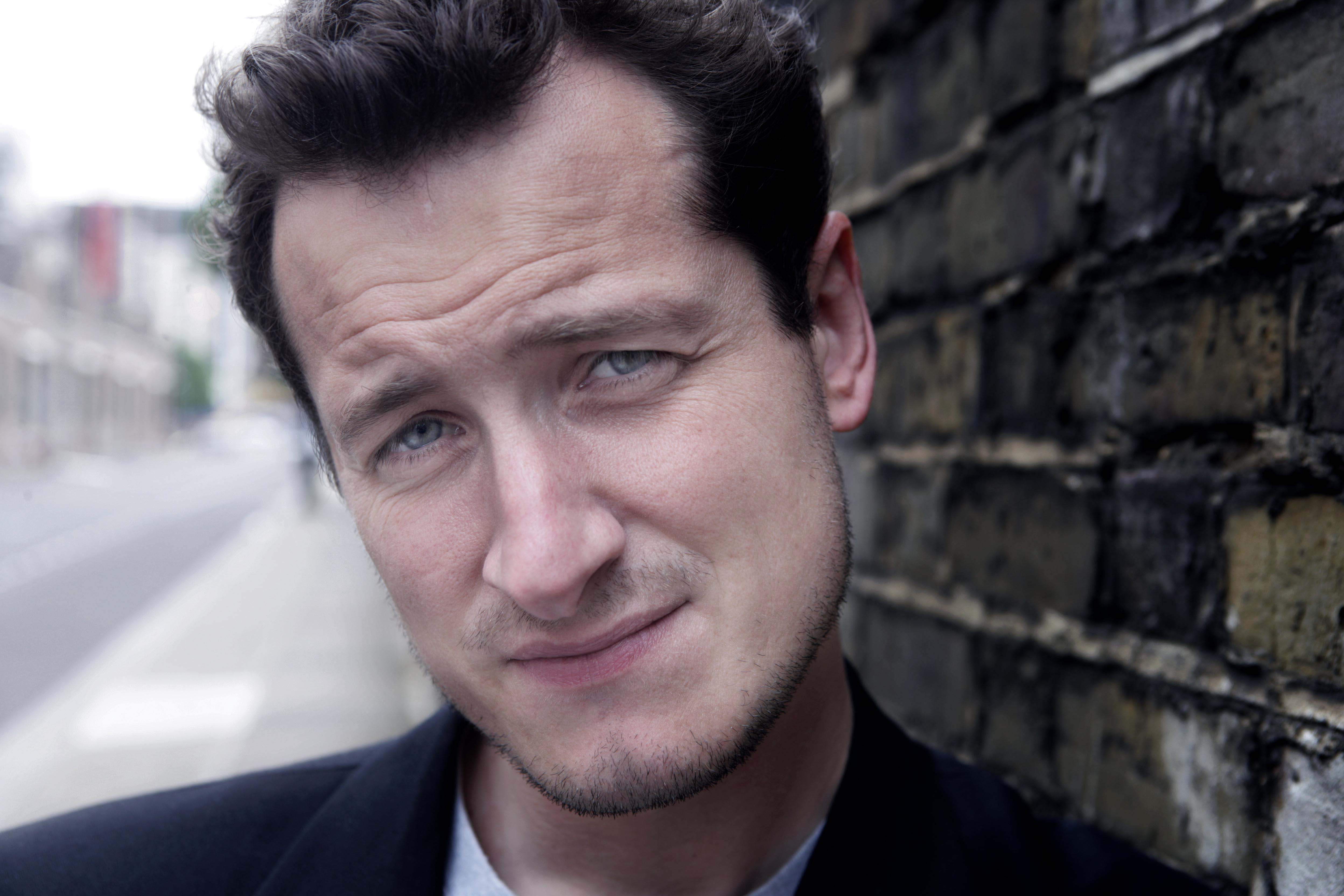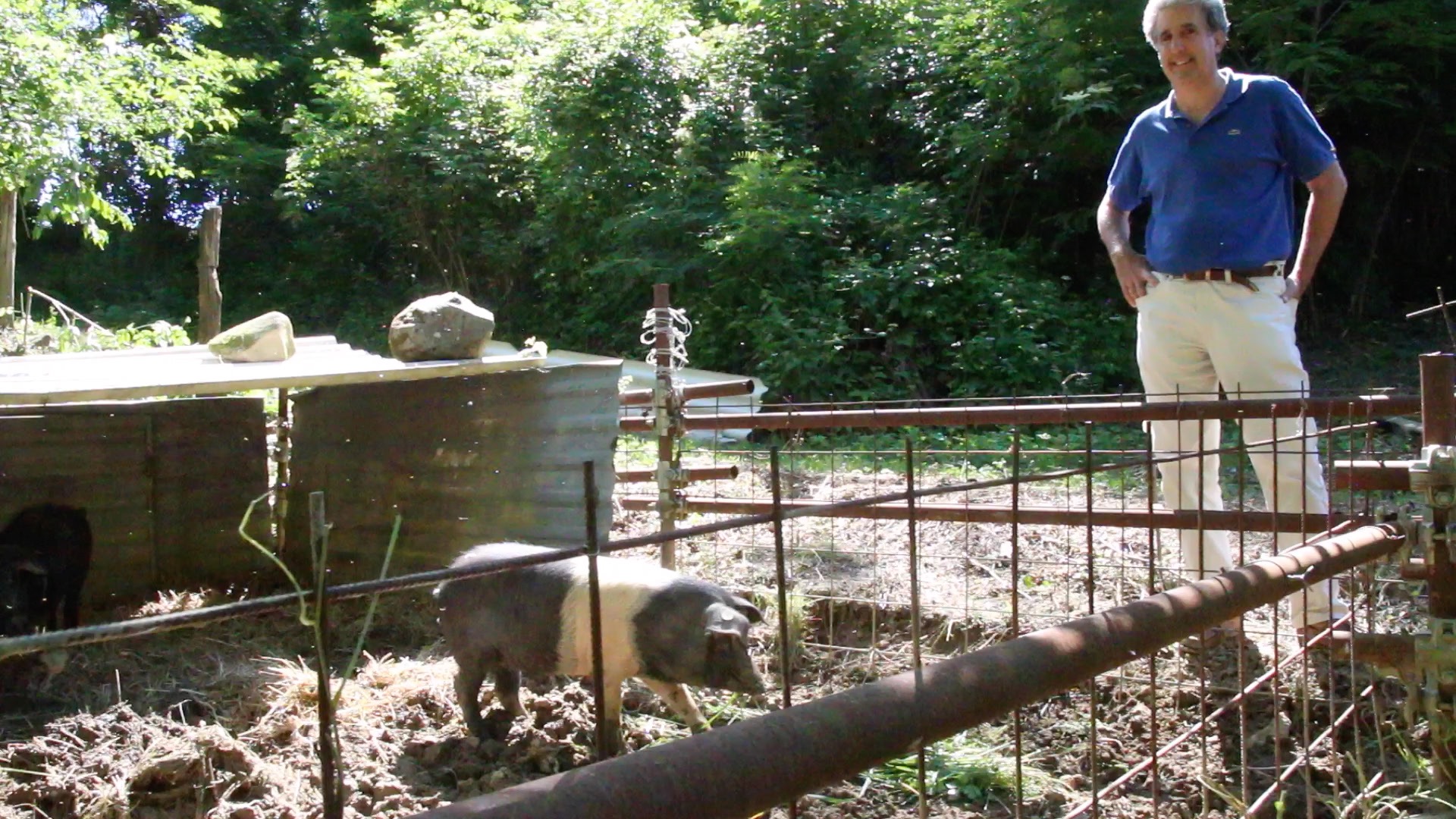
Lucca, located in the north of Tuscany, sits between the Apennine Mountains and the Tyrrhenian Sea. The Apennine Mountains have a strong influence on the growing conditions with a healthy amount of rains and cool nights and warm days which allow for a long growing season resulting in grapes that reach optimal ripeness. The clay soils and limestone marl produce exceptionally food-friendly wines with a unique minerality that have potential to age.
Lucca is similar to Sicily in that it is a very independent area in Italy with strong regional traditions. Luccan winemakers have always been focused on creating terroir-driven wines and have a strong relationship with organics and biodynamics. The wines are elegant and complex, almost French in their approach.
Winemaker Saverio Petrilli has been a pioneer in the region promoting biodynamic and organic practices. Today around 70 percent of the Lucca producers have abandoned pesticides and embraced organics. He talks to Monty Waldin about the rich culture of Lucca, why biodynamics makes for better wine and the joys of illegal pig farming.
Monty Waldin: Saverio, tell me a little about the history of the Tenuta di Valgiano estate here in Lucca.
Saverio Petrilli: We started back in 1994. My friends Moreno and Laura Petrini were buying the property and asked me whether it was a good spot to make wine. I told them if you like wine, just buy wine and don't try to make it because it's too tough!
They were tenacious enough to keep going and they got the property and then they called me in to manage it. Since then we've done a lot. We didn't know anything about Lucca, or the place. The place is obviously very beautiful but was not well-run before. Most of the properties were in that moment [undergoing a] change of generation. Many of them were rundown. We started really looking to what it was. Probably were clever not to change everything. Working on the old vineyards trying to understand how they were made, why they were made like that, and to get the best of what we had. We started planting some new vineyards and studying. Slowly we go to the point in which we planted the same grapes as what we found.
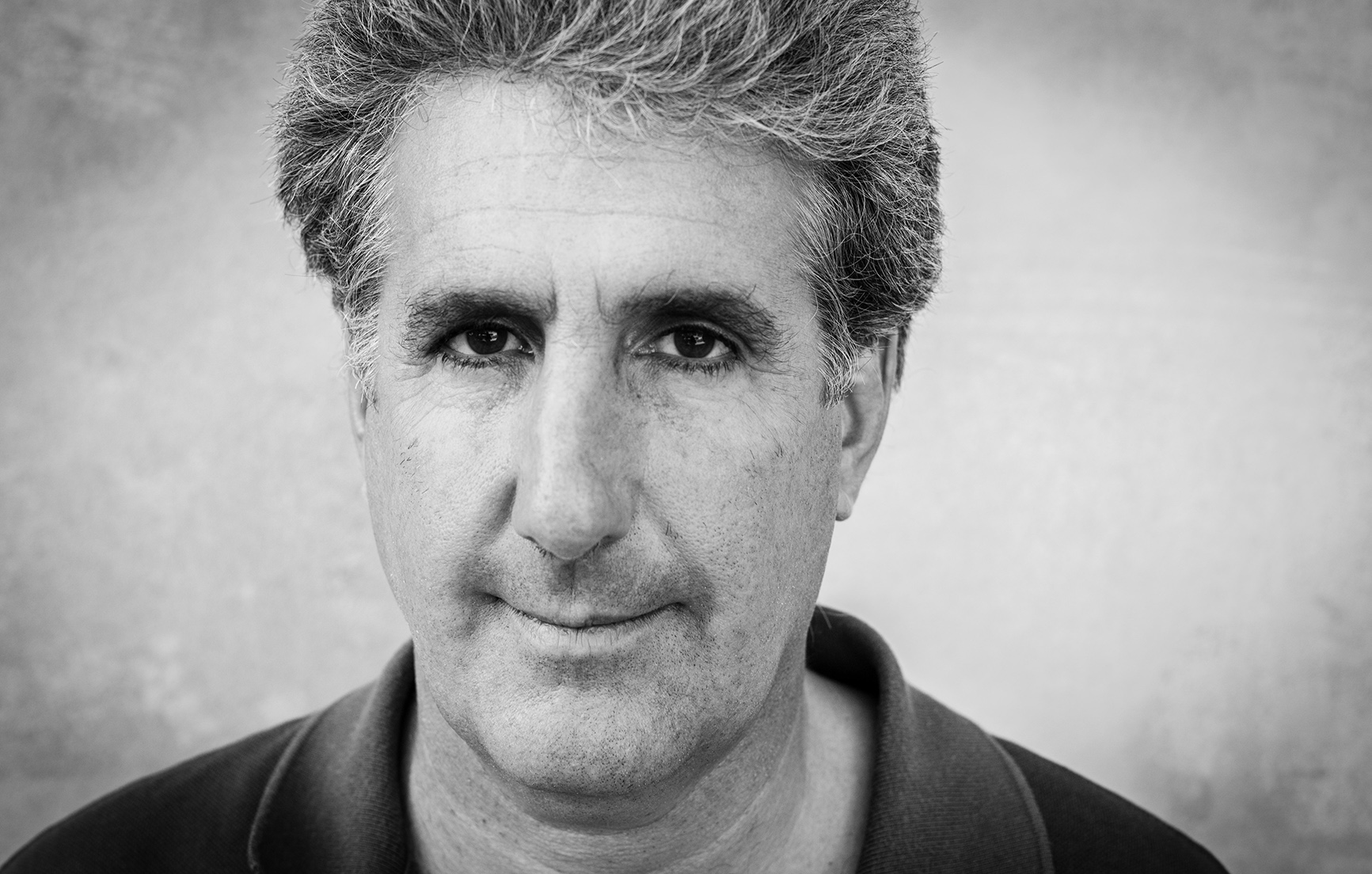
Saverio Petrilli photographed by Monty Waldin
You go to the end of the experimentation phase and then you ...:
Yes.
Where is Lucca in Tuscany?
We are north of Tuscany between the center and the sea, not far from the sea [the Mediterranean]. Very close, actually. It's 20 kilometers. We get the sea breeze almost every day during summer, which cools down. Because we are squeezed against the Apennine [mountains] (just behind us it raises up to 1,000 meters), during the night you usually have the cold wind from the mountains cooling down, ripening. In cold vintages it's probably tougher here for the grapes]. We never get the effect of heat. It's always cool, especially on the very dry and hot vintages. Here you always have good acidity, good freshness, slow ripening.
What are the red wines at Valgiano made from and why do they taste as they do?
Our red wine is always a blend. Maybe 70 percent is Sangiovese, but then there are plenty of [other grape] varietals. This is part of Lucca's history. Lucca's always been independent. It was a very wealthy republic in 1200 and developed its own identity. When Firenze became so powerful, they [the people of Lucca or the Lucchesi] have always been able to be independent, playing diplomatically between the pope and the Empire to maintain their independence. [But the Lucchesi were] Very open, where they were trading silk or other goods, visiting all other European states. Very open to anything new but slowly checking out everything.
As a [grape] varietal [Sangiovese] is un-typically un-Tuscan, in a way. Yes, Sangiovese. It does so well especially when we have the clay marl as a soil, but then they always added spices. Different varietals, some want more acid, some want more spice. Very useful for the extreme climate we can have.
When we understood this interaction between the soil and the climate, the varietal, which is what is actually called terroir, the culture of the people from Lucca, which took probably 10 to 12 years, we became more conscious of what we were doing and so we changed course from conventional methods. This was really the beginning. In '97 we became organic and in 2001 we became biodynamic. That has changed our life completely.
Biodynamic is such a great method of farming…it’s so effective. It's a much easier life for the farmer. I would have started earlier if I could turn the clock back. The result in wine is always a juiciness, a bright color and a bright nose [aroma]. Everything is brighter, more drinkable, mouthwatering. Which is again, also very clever. Then people drink more. They don't leave the bottle half full. In a way, it's lighter to digest.
I believe a farmer works in a sacred way because we are producing food for other people. We cannot be too materialistic. While I do have a bank director to satisfy at the end of the month, it's not all about the money. It is about producing what people eat and drink. There is spirituality in that. I think today in our lives everybody lives on his own. I just came back from this train ride and everybody had something or was reading, all sitting alone. Well, if you sit at a table with people you don't know, before you start the second glass of wine, you are friends. Wine is very good in opening. For that reason, it has to be light. It has to enlighten your life and open your soul.
You mentioned that Lucca is somewhat physically and politically separated from the rest of Tuscany. In terms of wine style, how different are we here in the Lucca hills, at Colline Lucchesi compared to say, Chianti or Brunello or Vino Nobile? What's the difference?
The climate is so different. Everything is so green and luscious and growing well. The soil is more easily full of humus, especially with biodynamics. Everything grows more abundantly and richer and softer. The wines are always very bright, but much softer. The acidity is like a vibration on a soft touch. It is what keeps the mouth alive when you drink it.
Would you say they're more French-style without, say, using the French varieties? Some of the Tuscan ones can be quite heavy, almost Californian.
Yes, definitely. Yes. The acidity is what you don't find very often in red French wine, but definitely the style is more refined like French wines. Definitely more French.
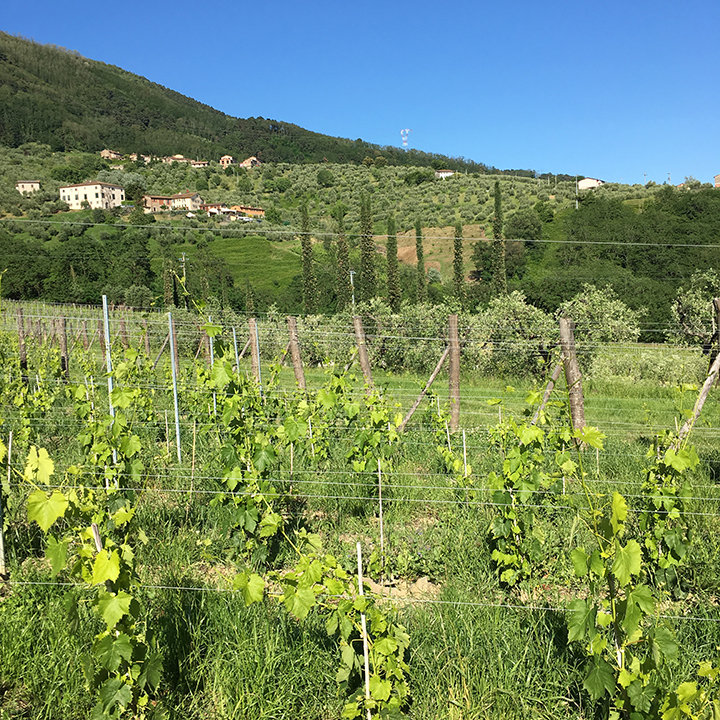
Saverio, just explain to me a little bit about the history of Tenuta Di Valgiano and your involvement in it.
We started more than 20 years ago because Moreno and Laura Petrini bought this property back then. He was a businessman but he was actually born 200 meters away from here and always loved this place. He wanted to live here and get it back in shape. The property was rundown. He hired me because he knew I was very open. I had made vintages in Australia and New Zealand, so he wanted an open-minded person ready to take on and respect the history of the place. We were ready to take it on together. We did a huge amount of work. Now looking back, trying to understand the potential of the place: what was good, what needed to change, the vineyard, why they made it like that, the place, respecting also the architecture of the place, not changing everything. The idea was to create in the bottle and in the glass the very best expression of this place, this culture, this soil, these vines. It's a very respectful process, and that's why it takes so long. We are now 22 years down the track with still a long way to go.
You trained in Australia but we're in the Old World here. Did you want to take the best of the New World in terms of cellar hygiene and their technical expertise and meld it with the soul of the Old World? Tell me about your winemaking philosophy, Saverio.
The idea is very simple. I was trained in Italy but learned a lot from the New World approach. Put everything under discussion, under a critical discussion, and never take anything for granted. We individuate some critical points in our winemaking. First of all, Tuscany's expression of tannins. That is managing the grapes as gently as possible. We avoid any mechanical treatment to avoid the skin or the seeds to be even brushed away, to be entirely integral.
You don't want to bruise the grapes, the skins, or damage the pip so that you get greenness in the wine.
Exactly. That way you get only the best of the tannins, a lot of the best. We became more and more gentle. The idea was taking away, making it more simple. Then we started using oak barrels. Especially with biodynamics, you have such amazing fruit flavors coming off. Oak is kicking down all the fruit. Of course you've got to buy the barrel new, but then we keep it for long, long aging. Every year we taste each single barrel and take out what we don't like. The average age is 10, 12 years. Even older.
Are you saying that with the use of older barrels, you don't get that kind of vanilla taste? It's just a nice neutral container to keep the wine in which lets it breathe without picking up any oaky flavor.
Exactly. It's very gentle. We don't use the pump. We use the air compressor for any racking [moving wine from one barrel to another]. Everything is gentle. No filtration, no clarification. The pump is used only when we really need to move the wine from one cellar to the other before bottling, and that's it.
Do people think you're a little bit old fashioned despite the fact that you've worked in Australia and New Zealand? Do they see you as a bit of an old fuddy duddy?
It's quite funny because in a way you tend to become more conservative when you reach a certain level of quality. I still consider myself as a young, very open person, but we've come a long way too, and now most of the time when they propose to me, I've tried so many things. Stuff you add to the wine. You try them, wait six months, taste the wine and reject it. That has happened so many times that now I'm less open in a way.
People often say Lucca's quite a difficult place to make wine because you have these lovely winds which keep disease at bay, but it can also be quite humid here. There's a massive percentage of organic growers here, probably one of the biggest in Italy. Why is that so?
That tells you already that this is one of the toughest places. We have between one meter, one and a half meter of water every year [1,000 to 1,500mm of rain or 40 to 60 inches of rain annually]. That makes a perfect life for any fungus [disease organisms like rot and mildew]. The reason why we're all biodynamic is because it is much easier to stop fungus to attack the vines in biodynamic than in conventional. In conventional you've got to spray day after day and you never end. It's a fight against this incredible nature we have here. You're never going to win. In biodynamic you're actually allied with nature. She's working for us. It’s much easier.
Are you saying the plants develop, the vines develop a natural resistance to disease like healthy kids running around, not kids tucked up and ….
Exactly. Good example.
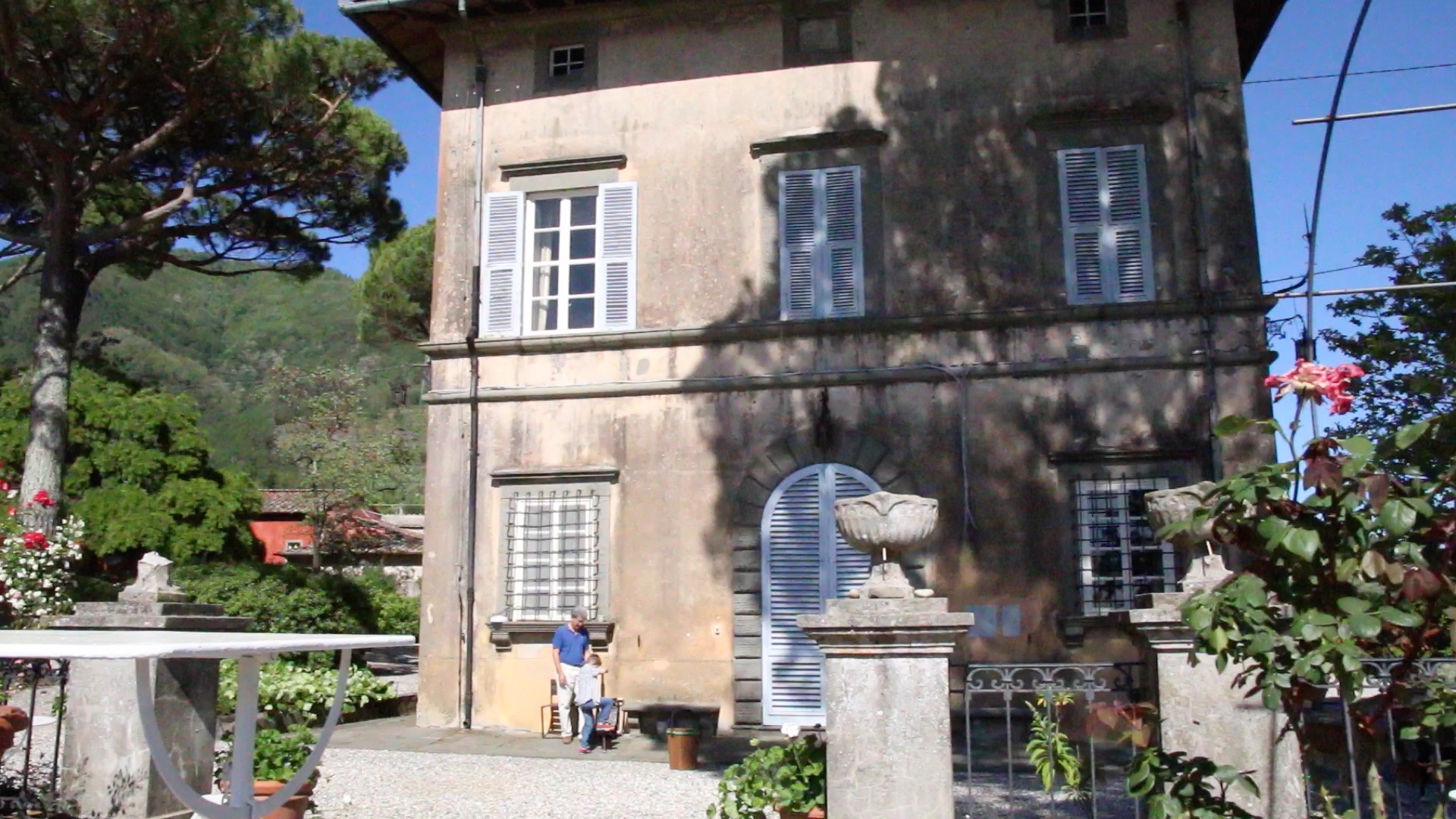
Tell me about the terroir of Valgiano.
We are very lucky to have this area around here. This is what geologists call "reverse duplex." It's a calcareous marl on which the river deposited an alluvial sandstone. The alluvial sandstone being the oldest soil and it's ended up on top of the calcareous marl. Then also one is acidic, the other one is alkaline. I think great things only come out of a contrast. We're very lucky for it. There also is a microclimate here. We always have this nice sea breeze coming (the sea is not far) during the day. At night from the mountain, 1,000 meters behind us, we have the cold wind coming through, so a very slow ripening. That's very good.
The Apennine Mountains, what are they exactly?
They are the backbone of Italy.
You're getting warm air from the sea and cold air at night from the mountains?
Exactly! What is very good is the sea breeze coming from the sea everyday. At night the cold wind coming from the mountain, 1,000 meters behind us, always delivers cool air that moves the warm air around the [grapevine] leaf so the leaf is more effective in photosynthesis [capturing the light and heat energies of the sun]. That's why we have brighter, aromatic, better tannins, because the photosynthesis is enhanced by not getting too warm around the leaf.
Since you've got this cool air cooling the leaves down, I guess it's a bit like being on a beach and always having access to water or a fan?
Exactly, yes.
What kind of soil do you have here at Valgiano?
The soil is very interesting, it is what made us realize we could make a great wine. It's a calcareous marl in which the river deposited acidic sandstone from the top. The geologists call it "reverse duplex" because the acidic sandstone is actually the older soil which was exposed. When Africa started to hit Europe, the Apennines raised up, the calcareous marl slid down, and then the alluvia brought it back. Now the two soils, acidic and alkaline, clash one against the other, and in this contrast you get a great expression of the terroir.
Is it confusing for a vine, putting it's roots down - that's a bit acidic, that's a little bit alkaline. How do they react?
I wouldn't know how to answer you. I certainly know, even human beings develop more in difficulty. It could be. I can see, in the beginning when I plant a new vineyard like this one, at the beginning they make good wine. As soon as the roots reach the other soil, then you get a different taste. You cannot recognize the varietal anymore, the taste of Valgiano. Probably this contrast makes the life more difficult.
Initially, the vine is going through what kind of soil?
The first part is the acidic sandstone; very easy to develop, good drainage. The bottom part is a calcareous marl clay soil.
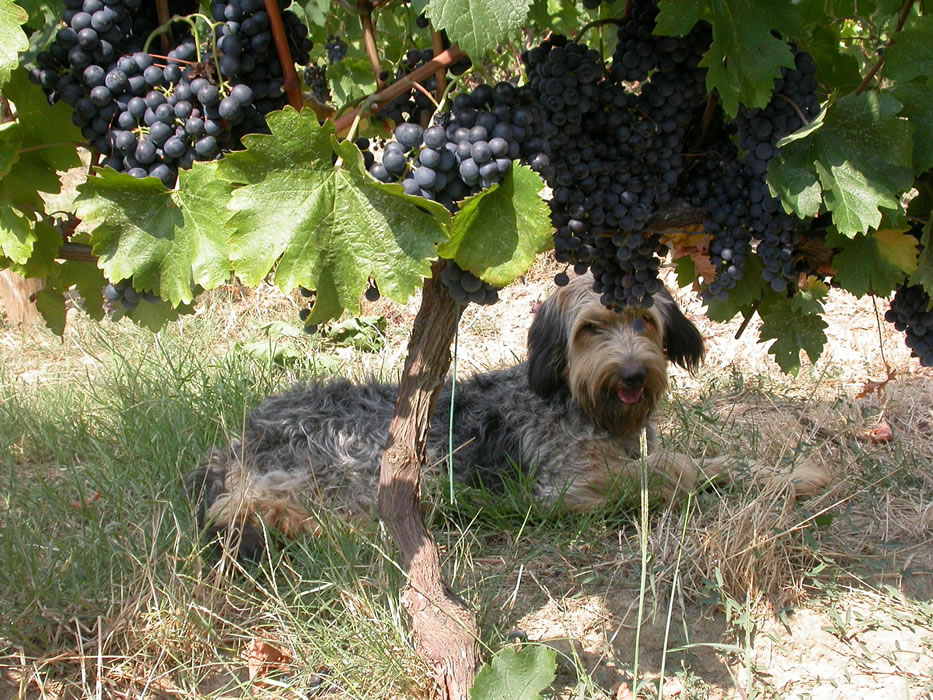
Is that a little bit tougher to get through for the roots?
Yes, very heavy clay. Also, the clay will hold moisture even in hot summer while the sandstone guarantees drainage in a wet vintage.
You've got the best of both worlds. If it's a hot year, they can get water and if it's a wet year, the soils can drain.
Yes.
What effects do those two soil types have, the acidic and the alkaline, on the taste and the color of your wines?
The calcareous marl builds the shoulder of the wine, the body, while all the acidic sandstone is full of minerals. If you see one of the stones, they all have different colors, a lot of crystals. That brings the flavors, the sparkle in the wine and makes it more drinkable, lighter in a way, more gentle. The marl makes the shoulder.
Do you think there are any other areas in Tuscany like Lucca in terms of the climate and soil?
I probably don't know enough, but the two soils are typical of all of Tuscany. It's very rare to find them one above the other. That is where we make, actually, our best wine.
How does Sangiovese grown in Lucca compare to say, Sangiovese grown in the Chianti Classico region, in Brunello di Montalcino, and in Vino Nobile di Montepulciano?
Certainly compared to Chianti Classico, there is more color because the light near the sea is greater than in central Tuscany. More color. The aromatics because more light means more photosynthesis. The aromatics are more complex in a way. You have more aspects in it. Biodynamics helps a lot in doing all this. Then also the taste is softer because you get better ripeness of the tannins.
Compared to Brunello, which is a very warm area.
Well, in Brunello, because we are very north, we are the opposite side of Tuscany, a cooler area so probably you get fresher aromatics, more acidity here. In Lucca the acidity is actually really juicy and full of fruit. Brunello probably is bigger, tougher, needs more time, and is definitely never on the fruit.
It's more on the ...
Let's say Brunello usually needs age. It will develop certain complexity but it will be much more on tertiary aromas than…
As opposed to juicy, ripe, black and red fruit.
Yes.
Compared to Vino Nobile, which is a little bit further inland?
If I compare it to Vino Nobile, I think Vino Nobile generally tends to be bigger, warmer, more mature. While here, you always have this sparkle in the aromatics, the acidity. It's a more drinkable wine. It's mouthwatering, juicy.
More fluid.
Yes, more fluid. Definitely more fluid.
Less heavy, maybe.
Yes.
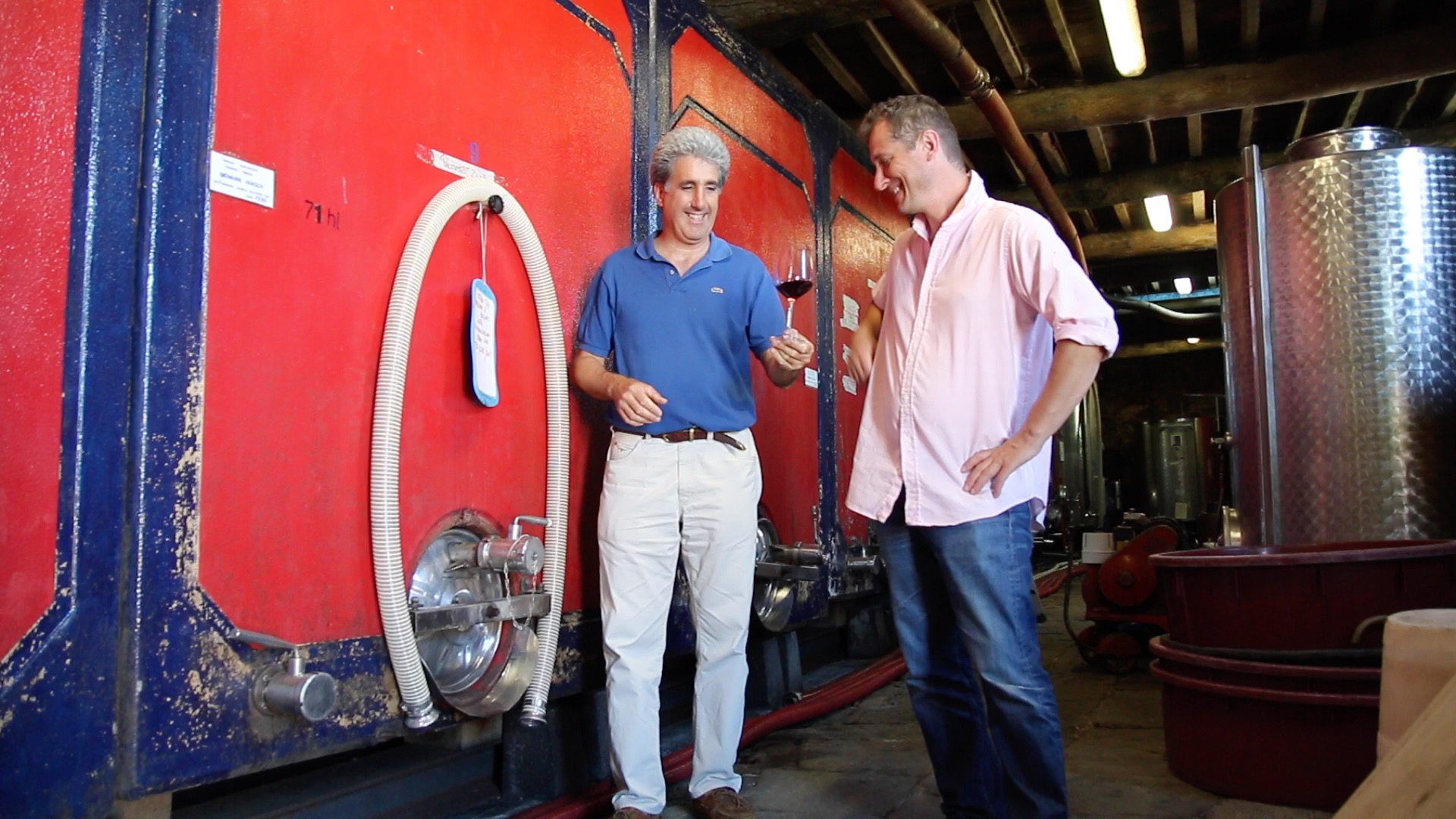
Saverio Petrilli with Monty Waldin
In the Lucca hills, the Colline Lucchesi, around 70 percent of you are not using any chemical pesticides and herbicides because of biodynamics.
Yes.
What is the reaction to that?
It's funny. If I compare myself, our region to the others, we are much bigger and stronger than the others.
You are the norm!
Yeah, exactly. When I talk to those who are organic, not yet biodynamic, I tell them, "You know, you've got a track in front of you. You've not arrived yet." The conventionally [minded wine-growers who are not organic or biodynamic] tend to be very shy in front of us. They are very objective and they recognize we are doing a good job. If they are not changing, there are other reasons. They are not frightened. It's mainly because they are too old to take a new change in it or ...
Problems within families and who is actually going to decide to make the decision. Maybe three brothers and one of them says no, we want to stay chemical.
Yes.
You spray your vineyard with cow manure and wild plants. Why do you do that? What are the benefits?
These biodynamic preparations are incredible soil builders. [Spraying horn manure or 500 in biodynamic-speak means] The soil becomes soft, it has been proven that it can hold [more] moisture. In the first hour it takes in 14 times more water than a conventional soil. It can hold all the elements, the minerals that the plants need. The plant is healthier. Then we spray [over the] top of [the vines] the ground silica [or 501 in biodynamic-speak], and that really shades the leaves and makes it more efficient in photosynthesis. You have the plant taking the best of the soil and expressing the best in the sunlight.
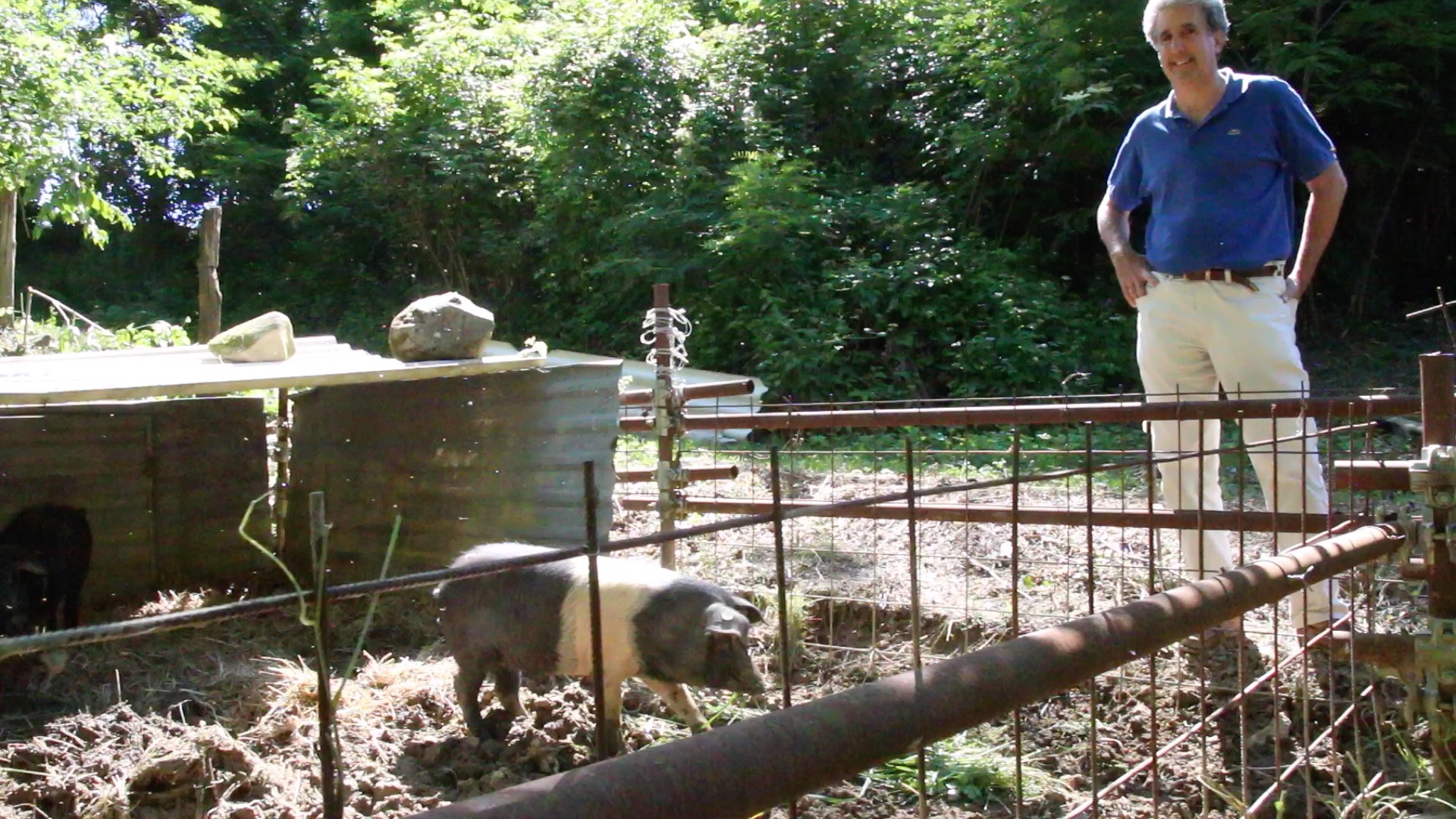
Tell me about the pigs.
Pigs! We started because we couldn't stay only with vegetables, in a way. We like to have some animals. The idea was just to produce something to eat for ourselves, which we did. The bureaucracy involved is crazy. After 10 years we decided we couldn't afford it anymore. We have four pigs which live in a beautiful forest. My wife says it's the Club Med for the pigs. [But] We have [officially to follow] the same rules as a 10,000 pig farm. So we stopped [the paperwork] and we discovered that by having our pigs, we were actually not being damaged by the wild pigs.
Why is that? What's the relationship between wild pigs or wild boar and your pigs that you got?
I realized that our pigs created a territory. The wild pigs came, but they're very shy. They would come and run out again.
Without eating any of your grapes?
Without eating any of the grapes. [After] Three years without the pigs and the wild pigs became the owner again, and last year I've lost an entire vineyard to the [wild] pigs. No grapes. I'm taking that back again [by getting a new set of domestic pigs]. I will resist bureaucracy.
Okay, illegal pig farming.
Monty Waldin was the first wine writer to specialize in green issues. He is the author of multiple books, including The Organic Wine Guide (Thorsons, 1999); Biodynamic Wines (Mitchell Beazley, 2004); Wines of South America (Mitchell Beazley, 2003), winner of America’s prestigious James Beard Book Award; Discovering Wine Country: Bordeaux (2005) and Discovering Wine Country: Tuscany (2006), both Mitchell Beazley; and Château Monty (Portico, 2008).
Buy Monty Waldin's detailed guide to the nuts-and-bolts of biodynamic wine-growing on Amazon.
